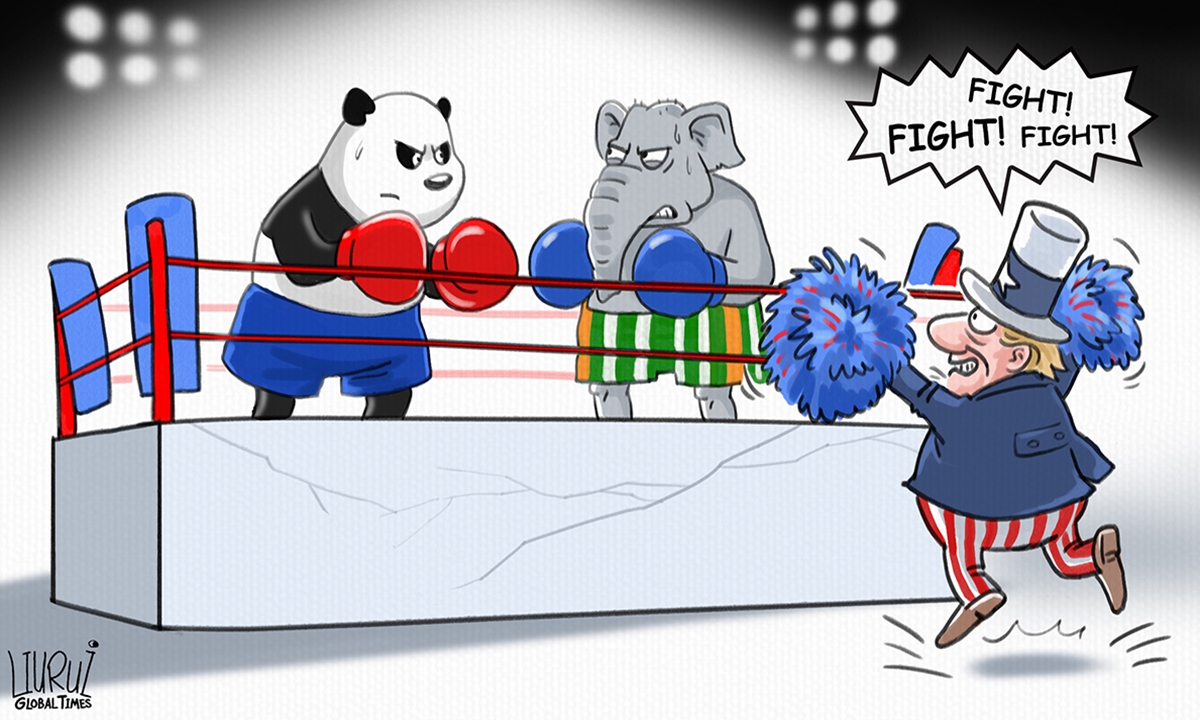
With an undisguised glee, Uncle Sam is nudging India into further spats with China. Illustration: GT
The United Nations said on Monday that India is about to surpass China to become the world's most populous nation - a status long held by China - by the end of this week. However, some Western media outlets have already taken this opportunity to exaggerate the contrast between China and India, trying to provoke new strife between the two.
What has really attracted the most attention in the past two days is a cartoon from the German magazine Der Spiegel. The cartoon shows two different trains standing side by side: One is old and crammed with people all around it, with one of them holding the Indian flag; the other is an advanced bullet train with the Chinese flag on its body, seemingly falling behind the first train.
The cartoon quickly sparked huge controversy among Indian people. Many Indian netizens and even politicians criticized the cartoon as "racist." Although Der Spiegel may want to show that China is technologically advanced compared to India, undoubtedly it also clearly harbors malicious intentions that some Western forces have demonstrated constantly in comparing China and India.
The world will now pay more attention to India as it becomes the most populous country in the world. At the same time, everything New Delhi does will inevitably be compared to Beijing. In particular, some Western forces that don't want to see China and India develop will certainly bash India for what China does better, and vice versa. People from both countries must be mentally prepared for this.
At such a historical moment of demographic change, the path before both China and India is not easy. India will have to find a way to benefit from its new found position. Instead of being distracted by Western hype and focusing too much on the "China-India comparison," both countries should focus more on tackling their pressures at home. They need to develop their own economies and improve people's livelihoods, which will make them stronger and better capable to deal with future challenges.
Long Xingchun, a professor at the School of International Relations at Sichuan International Studies University, told the Global Times that with an enormous population of similar size, China and India should enhance bilateral cooperation on the basis of such common ground. They should be more empathetic to each other and regard development as the most crucial issue.
At the same time, with such a similarity, Beijing and New Delhi can create more opportunities to cooperate in the international arena. As the world's two biggest developing countries, they can stand up more firmly and proactively for the interests of the Global South, particularly in the face of developed countries, if the two nations can join hands.
The combined population of China and India is nearly 3 billion, accounting for more than 30 percent of the world's population. The cooperation between the two is the one between two giants. If both countries can feed these 3 billion people and lead them eventually to a well-off life, it will be a great pillar for world peace and stability. India should hold a more broad-minded perspective as it surpasses China in terms of population. It needs to understand that falling into West's trap of the "China vs. India" narrative will only cause unnecessary strife that may hinder the prospect of win-win cooperation and common development.




